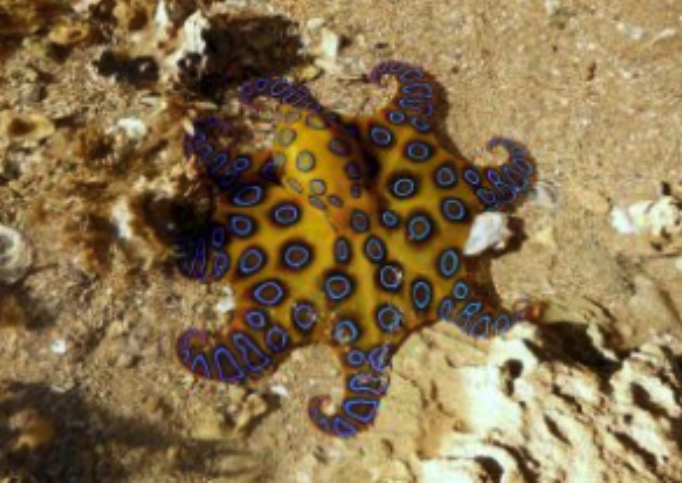The Blue-Ringed Octopus: Tiny but Deadly
The Blue-Ringed Octopus: Tiny but Deadly
By LUCA BERBERICH

(src: https://www.animalspot.net/blue-ringed-octopus.html)
Luca Berberich’s long standing interest in the natural world is being brought to the Talawanda Tribune in their series: Luca B. the Science G. Their first piece starts rather small. About 6 centimeters, actually…
Blue-Ringed Octopuses are a genus (a lower classification level that ranks just above species) of octopuses that are native to the Pacific ocean and are some of the deadliest killers of the sea. These little guys, whose maximum size is around 4 to 6 centimeters long, can inject deadly venom with their parrot-like beaks. In order to warn other sea creatures of their dangerousness, they flash bioluminescent rings on their skin in a vibrant shade of blue when agitated. They usually hang out in shallow waters, so be careful when wading!
What makes this type of Octopus a genus and not a species? While Blue-Ringed Octopuses are often considered a species, this assumption is incorrect. The Blue-Ringed Octopus genus, Hapalochlaena, consists of four named species. These species are the Greater Blue-Ringed Octopus, the Southern Blue-Ringed Octopus, the Blue-Lined Octopus, and a fourth, unnamed species that has been recorded only twice around the Andaman Islands in 1938 and 2013. The species that is the most different to the others is the Blue-Lined Octopus. As the name suggests, these octopuses do not display rings, but vibrant lines instead.
So just how venomous are these tiny menaces? While all octopuses are venomous to some extent, Blue-Ringed octopuses are in a league of their own. According to the official Ocean Conservancy website, Blue-Ringed Octopus venom is “1,000 times more
powerful than cyanide and, this golf-ball sized powerhouse packs enough venom to kill 26 humans within minutes”.
Despite the danger they pose, Blue-Ringed Octopuses are peaceful creatures that do not bite unprovoked. They are actually rather shy creatures– most octopuses are, especially in comparison to their cousins, the squids, who are affectionately referred to as “the jocks of the ocean”. Despite there being no known cure to Blue-Ringed Octopus venom, there have been no reported deaths caused by these creatures since the 1960s. In truth, coming in contact with a human is likely just as distressing to them as it is for you!
Sources cited:
- Newman, S. (2021, May 28). Blue-ringed octopus facts, habitat, life cycle, Venom, pictures. Animal Spot. Retrieved November 12, 2022, from
https://www.animalspot.net/blue-ringed-octopus.html
- The blue-ringed octopus: Small but deadly. Ocean Conservancy. (2022, January 3). Retrieved November 12, 2022, from
https://oceanconservancy.org/blog/2017/03/13/the-blue-ringed-octopus-small-but-deadly/ ● The blue-ringed octopus: Small, vibrant and deadly. Natural History Museum. (n.d.). Retrieved November 12, 2022, from
https://www.nhm.ac.uk/discover/blue-ringed-octopus-small-vibrant-deadly.html


